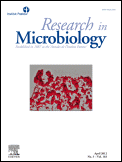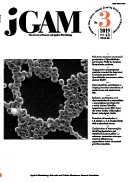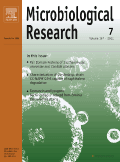
RESEARCH IN MICROBIOLOGY
Scope & Guideline
Advancing the frontiers of microbiological research.
Introduction
Aims and Scopes
- Microbial Interactions and Ecology:
The journal explores the interactions among various microbial communities, including their roles in ecological systems, biofilm formation, and the dynamics of plant-microbe interactions. - Antimicrobial Resistance and Pathogenicity:
A significant focus is placed on the mechanisms of antimicrobial resistance in pathogenic bacteria, including genetic factors and environmental influences that contribute to virulence. - Biotechnological Applications of Microbes:
Research in microbial biotechnology is highlighted, particularly in areas such as bioremediation, bioleaching, and the development of antimicrobial agents from microbial sources. - Molecular Microbiology and Genomics:
The journal emphasizes molecular techniques, including genomic and transcriptomic analyses, to understand microbial physiology, stress responses, and evolutionary adaptations. - Microbial Physiology and Metabolism:
Studies on microbial metabolism, including the biochemical pathways involved in nutrient utilization, stress responses, and secondary metabolite production, are central to the journal's scope. - Emerging Microbial Pathogens and Fungal Infections:
The journal addresses the rise of new microbial pathogens, including fungi, and the implications for public health, emphasizing the need for novel treatment strategies.
Trending and Emerging
- Biofilm Research and Anti-biofilm Strategies:
There is a notable increase in studies addressing biofilm formation, mechanisms, and strategies to combat biofilms, reflecting their critical role in persistent infections and industrial applications. - Antimicrobial Resistance Mechanisms:
Emerging themes focus on understanding the genetic and biochemical basis of antimicrobial resistance, with an emphasis on novel resistance genes and their regulation. - Microbial Genomics and Metagenomics:
The application of genomic techniques, including metagenomics, is rapidly growing, facilitating the exploration of microbial community dynamics and their functional potentials in various environments. - Microbial Interactions with Host Organisms:
Research exploring the interactions between microbes and host organisms, particularly in human health and disease contexts, is gaining traction, highlighting the importance of microbial roles in immunity and pathogenesis. - Biotechnological Innovations:
There is an increasing focus on biotechnological applications of microorganisms, including the development of new antimicrobial agents and leveraging microbial processes for sustainable practices in agriculture and industry. - Extremophiles and Their Applications:
Research on extremophilic microorganisms is trending, particularly their unique adaptations and potential biotechnological applications in harsh environments.
Declining or Waning
- Environmental Microbiology:
Research specifically focused on environmental microbiology, such as microbial ecology in natural settings, has decreased, possibly as more emphasis is placed on applied microbiology and biotechnology. - Classical Bacteriology Techniques:
Traditional methods in bacteriology, such as culture-dependent techniques, are less prevalent as molecular and genomic approaches gain favor for their sensitivity and specificity. - Plant Pathology Studies:
The focus on microbial pathogens specific to plant diseases appears to be waning, likely due to a shift towards broader studies of microbial interactions and their implications for agriculture. - Fungal Diversity and Taxonomy:
Research dedicated solely to the taxonomy and diversity of fungi seems to be declining, as studies increasingly incorporate functional and applied aspects of fungal biology.
Similar Journals

MOLECULAR MICROBIOLOGY
Unveiling the Molecular Secrets of MicrobiologyMOLECULAR MICROBIOLOGY is a prestigious academic journal published by Wiley that has been at the forefront of research in the fields of microbiology and molecular biology since its inception in 1987. With an impressive Q1 rating in Microbiology and a Q2 rating in Molecular Biology for 2023, this journal serves as a vital platform for disseminating high-impact research that advances our understanding of microbial processes and interactions at the molecular level. The journal's ISSN is 0950-382X, and the E-ISSN is 1365-2958, making it easily accessible to a global audience of researchers, professionals, and students. Though not an Open Access journal, MOLECULAR MICROBIOLOGY remains committed to providing valuable insights and fostering knowledge exchange in the academic community. Situated in the United Kingdom and indexed in prominent databases like Scopus, the journal holds a strong standing, with current rankings reflecting its influential role in the academic landscape. Researchers in the field are invited to contribute and engage with cutting-edge discoveries that will shape the future of microbiological sciences.

TRENDS IN MICROBIOLOGY
Advancing the Frontiers of Microbial ScienceTRENDS IN MICROBIOLOGY is a premier academic journal published by CELL PRESS, renowned for its high-impact research contributions in the fields of microbiology, infectious diseases, medical microbiology, and virology. With an impressive impact factor and a notable Scopus ranking—placing it in the top tiers of its categories, including a remarkable Q1 status in multiple disciplines—this journal is essential for researchers, professionals, and students aiming to stay at the forefront of innovative microbial research and ongoing advancements in pathogen biology. Since its inception in 1993, TRENDS IN MICROBIOLOGY has provided a platform for thought-provoking reviews and critical insights, fostering discussions that shape the future of the microbiological sciences. Based in the United Kingdom, TRENDS IN MICROBIOLOGY continues to lead the way in disseminating vital knowledge within the global scientific community.

JOURNAL OF GENERAL AND APPLIED MICROBIOLOGY
Advancing microbial insights for a healthier tomorrow.JOURNAL OF GENERAL AND APPLIED MICROBIOLOGY, published by the MICROBIOL RES FOUNDATION, is a vital resource in the fields of applied microbiology and biotechnology, as well as in diverse medical applications, serving an academic community dedicated to advancing microbial science. Established in 1955, this journal has a rich history of disseminating innovative research and insights into the intricate world of microorganisms. With an ISSN of 0022-1260 and an E-ISSN of 1349-8037, the journal maintains high scholarly standards and robustness, reflected in its 2023 Scopus rankings placing it in the Q3 and Q4 quartiles within its categories. While primarily based in Japan, the journal engages a global audience, offering valuable contributions that inform both theoretical perspectives and practical applications in microbiology. Despite being a non-open-access publication, it provides pivotal research findings essential for academics, professionals, and students alike, fostering a deeper understanding of microbial impact on health and the environment.

Microbial Physiology
Exploring the Intricacies of Microbial LifeMicrobial Physiology is a premier, peer-reviewed journal published by KARGER, dedicated to advancing the field of microbiology through innovative research and reviews. With an ISSN of 2673-1665 and an E-ISSN of 2673-1673, the journal stands out in the academic landscape having established a strong track record since its inception in 2020, converging its scope until 2024. It proudly holds a Q2 category ranking in several key areas including Applied Microbiology and Biotechnology, Biochemistry, and Microbiology, making it an essential resource for researchers and professionals in these disciplines. The journal provides open access options to ensure that cutting-edge findings are widely disseminated, fostering collaboration and knowledge sharing. As a vital contributor to the ongoing discourse in microbial physiology, the journal serves as a platform for novel discoveries and methodologies that can significantly impact health, industry, and environmental sustainability. Located in Basel, Switzerland, it brings together a global community of scholars eager to further explore the complexities of microbial life.

WORLD JOURNAL OF MICROBIOLOGY & BIOTECHNOLOGY
Advancing the Frontiers of Microbial InnovationWORLD JOURNAL OF MICROBIOLOGY & BIOTECHNOLOGY, published by Springer, serves as a pivotal forum for advancing the fields of microbiology and biotechnology since its inception in 1990. Located in the Netherlands, this esteemed journal has secured a prominent position in the academic landscape, recognized for its strong impact factor and prestigious Q2 category rankings across disciplines such as Applied Microbiology, Biotechnology, and Physiological Sciences. Researchers and professionals utilize this journal to disseminate innovative findings and explore emerging technologies that are transforming the scientific landscape. With a robust submission rate and high visibility among the academic community, the journal fosters interdisciplinary collaboration, encouraging discussions that bridge gaps between theory and practical applications. As it converges into 2024, the WORLD JOURNAL OF MICROBIOLOGY & BIOTECHNOLOGY continues to be a vital resource for scholars aiming to enhance our understanding of microbial processes and biotechnological advances.

Microorganisms
Unveiling the mysteries of microbial life.Microorganisms is a leading open-access journal published by MDPI based in Switzerland, catering specifically to the rapidly evolving fields of microbiology and virology. Since its inception in 2013, the journal aims to foster the dissemination of high-quality research through its comprehensive and interdisciplinary platform, with a particular focus on both fundamental and applied microbiological sciences. Contributing to its esteemed reputation, Microorganisms holds a commendable Q2 ranking in the categories of Microbiology and Virology, as well as in Medical Microbiology, highlighting its significance in the academic community. With a consistent impact, evidenced by its rankings in Scopus—such as rank #25 in Virology and #56 in Microbiology—the journal serves as an invaluable resource for researchers, professionals, and students looking to stay at the forefront of microbiological research. As an open-access journal, Microorganisms ensures that vital research findings are readily available to a global audience, promoting collaboration and innovation in the study of microbial life and its implications for health and disease.

FOLIA MICROBIOLOGICA
Fostering Knowledge for Future Microbiologists.FOLIA MICROBIOLOGICA is a distinguished academic journal published by SPRINGER, focusing on the intricate realms of microbiology and its contributions to medicine. Since its inception in 1957, the journal has been a vital platform for disseminating pioneering research, addressing contemporary challenges in the field while facilitating discourse among researchers, clinicians, and students alike. With an ISSN of 0015-5632 and an E-ISSN of 1874-9356, FOLIA MICROBIOLOGICA publishes original articles, reviews, and critical insights that span not only traditional microbiological studies but also innovative applications in immunology and biotechnology. The journal is categorized within the esteemed Q2 tier in Medicine (Miscellaneous) and holds a Q3 rating in Microbiology as of 2023, reflecting its significant impact and relevance in the scientific community. Although it does not currently offer open access, it remains a respected resource, enabling professionals and students to keep abreast of advancements from its base in the Netherlands. With a strong commitment to quality and rigorous peer-review, FOLIA MICROBIOLOGICA serves as an essential repository of knowledge, fostering the next generation of microbiologists and medical practitioners.

mSphere
Championing open access to revolutionary microbial research.mSphere is a leading open-access journal published by the American Society for Microbiology, dedicated to the dynamic fields of Microbiology and Molecular Biology. Since its inception in 2016, mSphere has rapidly established itself as a reputable source of scholarly research, achieving notable impact factors and excellence within the academic community. The journal ranks in the top quartile (Q1) amongst its peers in Microbiology, and Q2 in the field of Molecular Biology, demonstrating its significance and relevance through Scopus rankings—specifically, it holds the #42 spot out of 182 in the Microbiology category and #108 out of 410 in Molecular Biology. With an editorial commitment to advancing the understanding of microbial and molecular sciences, mSphere provides an accessible platform for researchers, professionals, and students alike to disseminate groundbreaking findings. The journal promotes rigorous peer-review and invites innovative contributions aimed at enhancing microbial research mobility and molecular exploration. Accessible openly since 2016, mSphere continues to thrive as an influential publication driving scientific dialogue and discovery in the microbiological sciences.

Microbiology Research
Exploring the Microbial Universe, One Study at a TimeMicrobiology Research, published by MDPI, stands as a pivotal open-access journal in the field of microbiology, having established its presence since 2010. Based in Switzerland, this journal strives to provide a platform for innovative research and cutting-edge findings in various branches of microbiology, including medical microbiology and molecular biology. With an impact factor that reflects its dedication to scholarly excellence, Microbiology Research is classified in the Q3 category for both microbiology and medical microbiology, and Q4 for molecular biology as of 2023, indicating its growing importance and outreach within these domains. The journal aims to foster discussion and collaboration among researchers, professionals, and students by presenting articles that cover a wide array of topics and methodologies in microbiological research. Leveraging its open-access model, Microbiology Research ensures that high-quality research is accessible to a global audience, thus facilitating the advancement of knowledge and innovation in the microbial sciences.

MICROBIOLOGICAL RESEARCH
Driving Excellence in Microbiological DiscoveriesMICROBIOLOGICAL RESEARCH, published by Elsevier GmbH, serves as a leading platform for advancements in the field of Microbiology, holding an impressive Q1 ranking in its category as of 2023. With an ISSN of 0944-5013 and E-ISSN 1618-0623, this journal has been instrumental in disseminating high-quality research since its inception in 1994 and continues to contribute significantly to the academic landscape through 2024. Positioned within the top 13% of publications in the Immunology and Microbiology category, ranked #24 out of 182 according to Scopus, it attracts the attention of researchers, professionals, and students alike. While the journal is not open access, it offers vital insights and peer-reviewed articles that drive innovation and exploration within microbiological research. Its rigorous selection process underscores the importance of quality and relevance in advancing knowledge in this dynamic field.